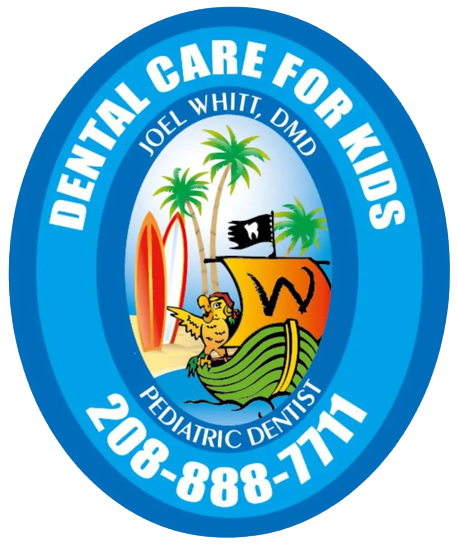

WELCOME TO OUR PRACTICE
Dental Care for Kids
One step into Dental Care for Kids and you and your family will understand why we are the top pediatric dentists of Meridian, Idaho. Our talented dentists and friendly staff know how to make your child smile—in a fun, unintimidating atmosphere. Please use this website to learn more about pediatric dentistry and your child's dentists, Dr. Joel Whitt and Dr. Brock Coletti.
If you live in the Boise area (Nampa, Caldwell, Kuna, and Eagle ), start your child on the path to a healthy smile today: call Dental Care for Kids at 208.888.7711.

Our Top Services
-
![Routine Check ups Routine Check ups]()
Routine Check ups
As children grow, their teeth and jaws also grow and develop. Pediatric dentists specialize in treating young patients and ensure that everything is developing as it should. During their visits, pediatric dentists perform routine cleanings and take X-rays as necessary to monitor growth and development. They can also provide preventative advice to help patients avoid tooth decay and other common dental issues. In addition to regular dental care at Dental Care for Kids, our pediatric dentists can also help treat a variety of issues that many young patients have, including thumb sucking, pacifier use, poor oral hygiene habits, teething pain, dental trauma, and more. Having a dentist specializing in pediatric dentistry can benefit young patients and help them maintain good oral health as they grow into adulthood. WHAT ARE THE MOST COMMON TREATMENTS FOR CHILDREN? Most children are cavity free when they leave the dentist, so there is no need for fillings or other restorative treatments. Instead, many pediatric dentists focus on preventive dental care to promote good oral hygiene habits that last a lifetime. This includes cleanings, fluoride treatments, and sealants. Children are also taught about proper brushing and flossing techniques to prevent cavities from forming in the first place. During the appointment, the pediatric dentist will also check your child’s teeth for signs of decay to identify any problems early on so they can be treated. This will help avoid additional future procedures, such as root canal therapy or crowns. Other common treatments that are performed on children include tooth extractions and mouthguards. Extractions are sometimes necessary if a tooth is severely decayed and cannot be saved with fillings or crowns. Mouthguards protect the teeth and jaw during sports and other activities where the face may be hit. These custom-fit appliances help protect the teeth and prevent them from becoming damaged. THE BENEFITS OF PEDIATRIC DENTISTRY SPECIALIZED EXPERTISE Pediatric dentists have specialized training and experience in treating the unique dental needs of children. Dr. Whitt and Dr. Coletti spent two extra years after dental school to better understand the complexities of dental development in children, including the eruption of primary (baby) teeth and the transition to permanent teeth. Their expertise allows them to provide appropriate and effective dental care for young patients. PREVENTION AND EARLY INTERVENTION Pediatric dentists focus on preventive care to maintain optimal oral health in children. They educate parents and children on proper oral hygiene practices, including brushing, flossing, and dieting. Regular dental check-ups and cleanings help identify potential dental issues early on, allowing for timely intervention and preventing more severe problems. EDUCATION AND GUIDANCE Pediatric dentists educate parents and caregivers on proper oral hygiene practices, nutrition, and habits that affect a child's oral health. They provide guidance on topics such as teething, thumb sucking, pacifier use, and the importance of a balanced diet for oral health. This empowers parents to make informed decisions and establish healthy oral care habits for their children. The primary goal of pediatric dentistry is to promote good oral health habits and prevent dental problems in children. For the best dental care, visit Dental Care for Kids at 3235 N Towerbridge Way, Suite #200, Meridian, ID 83646, or call (208) 888-7711 [tel:2088887711].
-
![Fluoride Fluoride]()
Fluoride
Fluoride is a mineral that naturally occurs in water, soil, plants, and animals. It’s also present in many foods, such as fish, eggs, and rice. While small amounts of fluoride occur naturally in everyone’s water supply, tons of it are used to prevent tooth decay on our teeth by strengthening them — making them more resistant to decay. Fluoride treatments are a common preventive measure in pediatric dentistry to promote optimal oral health in children. At Dental Care for Kids, the primary purpose of fluoride treatments is to strengthen the tooth enamel and make it more resistant to tooth decay. Fluoride is a naturally occurring mineral that helps prevent cavities by remineralizing the weakened areas of the enamel and inhibiting the growth of bacteria that cause decay. THE PROCEDURE FOR FLUORIDE TREATMENTS Before applying the fluoride, the dental professional will clean the child's teeth using a toothbrush and toothpaste with a gritty fluoride-free paste. This step removes any plaque or debris from the tooth surfaces to ensure better fluoride absorption. The dental professional will paint a thin layer of fluoride varnish onto the surfaces of the teeth using a brush or applicator. The varnish adheres to the teeth and slowly releases fluoride over time. It is safe to swallow, and the child can eat and drink immediately after the application. THE BENEFITS OF FLUORIDE TREATMENTS FOR CHILDREN PREVENTION OF TOOTH DECAY Fluoride is highly effective in preventing tooth decay, which is a common dental problem in children. It strengthens the tooth enamel and makes it more resistant to acid attacks from bacteria and sugary foods. Regular fluoride treatments can significantly reduce the risk of cavities and the need for extensive dental treatments in the future. REMINERALIZATION OF ENAMEL Fluoride has the ability to remineralize the weakened areas of the tooth enamel. When the enamel is demineralized by acids produced by bacteria, fluoride helps to repair and strengthen the enamel, making it more resistant to decay. This helps to prevent the progression of early cavities and can reverse early stages of tooth decay. PROTECTION FOR DEVELOPING TEETH Children's teeth, especially permanent teeth, are still developing and are more vulnerable to decay. Fluoride treatments provide an added layer of protection during this critical period of tooth development. They help ensure that the permanent teeth erupt into a healthy oral environment, reducing the risk of cavities and other dental issues. Fluoride treatments can significantly reduce the risk of cavities in children and promote the development of strong, healthy teeth. For more information visit Dental Care for Kids at 3235 N Towerbridge Way Suite #200, Meridian, ID 83646 or call (208) 888-7711 [tel:2088887711].
-
![Sealants Sealants]()
Sealants
At Dental Care for Kids, dental sealants are protective coatings that are applied to the chewing surfaces of the back teeth to prevent cavities from forming. The grooves of the molars are difficult to clean, so many patients experience cavity formation over time despite regular brushing and flossing. When placed, the sealant acts as a barrier against food particles and plaque buildup, reducing the number of bacteria on the teeth and the risk of cavities. They are typically applied during a child’s early permanent molars erupt around age six, but adults can also benefit from using dental sealants. THE PROCESS OF APPLYING DENTAL SEALANTS The dental hygienist or dentist thoroughly cleans the teeth that will receive sealants. This cleaning ensures the tooth surfaces are free from plaque, food particles, or debris. Once the teeth are clean and dry, the dentist may apply an etching gel or liquid to the chewing surfaces of the teeth. This etching solution creates a slightly rough surface on the enamel, which helps the sealant material adhere better to the tooth. The dentist will apply the liquid sealant material onto the chewing surfaces of the teeth. They may use a brush or a small applicator to spread the sealant evenly across the grooves and pits. The sealant is typically a tooth-colored or clear resin material that bonds to the tooth enamel. After applying the sealant material, the dentist will use a special curing light to harden and set the sealant. The light activates the sealant material, causing it to bond securely to the tooth surface. Once the sealant is cured, the dentist will check its placement and make any necessary adjustments. They will ensure that the sealant covers all the vulnerable areas of the tooth and is properly sealed. ARE SEALANTS SAFE? Yes, sealants are generally considered safe and nontoxic to teeth. Dental sealants are applied to the chewing surfaces of back teeth and are a great way to prevent cavities on kids’ molars. This safe, inexpensive, and effective procedure only takes a few minutes. Sealants are made of plastic that coats the tooth to protect it from plaque and bacteria. This coating prevents food particles and sugars from being trapped on the tooth’s surface and causing decay. The plastic resin material comes in colors that make the sealants nearly invisible when your child smiles. The primary purpose of sealants is to protect the teeth from cavities. Visit Dental Care for Kids at 3235 N Towerbridge Way Suite #200, Meridian, ID 83646, or call (208) 888-7711 [tel:2088887711] to determine if sealants suit your child's teeth and to discuss the best timing for their application.
-
![Dental Emergencies Dental Emergencies]()
Dental Emergencies
Dental emergencies can happen unexpectedly and require prompt attention to address pain, prevent further damage, and maintain oral health. Dental emergencies for children are situations where immediate dental care is needed to address an urgent dental issue. Children may experience dental emergencies due to accidents, injuries, or sudden onset of severe dental pain. For the best dental care, visit Dental Care for Kids. COMMON DENTAL EMERGENCIES FOR CHILDREN KNOCKED-OUT TOOTH (AVULSED TOOTH) If a permanent tooth is completely knocked out, it is considered a dental emergency. Prompt action can increase the chances of saving the tooth. Handle the tooth by the crown (avoid touching the root), rinse it gently with water if dirty, and try to reinsert it into the socket. If reinsertion is impossible, place the tooth in a container with milk or the child's saliva and seek immediate dental care. BROKEN OR FRACTURED TOOTH A broken or fractured tooth can cause pain and discomfort. Rinse the child's mouth with warm water, apply a cold compress or ice pack to reduce swelling, and seek dental care as soon as possible. The dentist will assess the extent of the fracture and determine the appropriate treatment. TOOTHACHE Persistent or severe toothache in children should not be ignored. Rinse the child's mouth with warm water and use dental floss to remove any trapped food particles. Avoid applying aspirin or pain relievers directly to the tooth or gums. Contact a pediatric dentist for an appointment to identify and treat the cause of the toothache. SOFT TISSUE INJURIES Injuries to the lips, tongue, cheeks, or gums can result in bleeding and pain. Clean the area gently with water, apply pressure with a clean cloth or gauze to control bleeding, and seek immediate medical attention if the bleeding is severe or does not stop. THE BENEFITS OF VISITING AN EMERGENCY DENTIST PAIN RELIEF Dental emergencies often involve pain and discomfort. The child can receive appropriate treatment to alleviate pain and provide relief by seeking immediate dental care. PRESERVATION OF NATURAL TEETH Dental emergencies, such as knocked-out or broken teeth, can jeopardize the integrity of the child's natural teeth. Seeking prompt dental care increases the chances of saving the affected tooth or preventing further damage to neighboring teeth. RESTORATION OF FUNCTION Dental emergencies can affect the child's ability to chew, speak, and perform daily activities. Prompt dental treatment aims to restore the normal function of the teeth and mouth, allowing the child to resume their regular activities without discomfort or limitations. In any dental emergency involving a child, it is crucial to visit Dental Care for Kids at 3235 N Towerbridge Way Suite #200, Meridian, ID 83646, or call (208) 888-7711 [tel:2088887711] to consult our pediatric dentist as soon as possible. They can provide appropriate advice, evaluate the situation, and effectively administer necessary treatment to address the dental emergency.
-
![Fillings Fillings]()
Fillings
A dental filling is a restorative procedure used to repair a tooth affected by decay, cracks, fractures, or wear. The decayed or affected portion of the tooth will be removed, and the tooth will be filled with a dental filling material. Children benefit from having their teeth filled early to prevent cavities from forming and address any discolored or decayed teeth. Your dentist will essentially “fill” your child’s tooth with a safe material to avoid further decay or discoloration. The filling will be shaped and polished to resemble the child’s natural tooth. It’s quick, easy, painless, and affordable! THE PROCEDURE FOR DENTAL FILLINGS * Nitrous oxide is typically used to reduce anxiety and increase a child's ability to cooperate for treatment. * The child may receive local anesthesia to numb the area around the affected tooth, ensuring a pain-free procedure. * The dentist will remove the decayed portion of the tooth using a dental drill, leaving a clean and healthy tooth structure. * The composite filling material is applied in layers and shaped to restore the natural contour of the tooth. A curing light hardens the material, ensuring it bonds securely to the tooth structure. * The dentist will check and adjust the filling to ensure the child's bite is comfortable and the tooth functions properly. The filling is polished to smooth out any rough edges and provide a natural appearance. THE BENEFITS OF DENTAL FILLINGS FOR CHILDREN TREATMENT OF TOOTH DECAY Dental fillings remove decayed portions of the tooth and restore the damaged area. By treating tooth decay with fillings, the progression of decay is halted, preventing further damage to the tooth structure. PAIN RELIEF Tooth decay can cause tooth sensitivity and pain, especially when the cavity reaches the inner layers of the tooth where the nerves are located. Dental fillings eliminate the decayed part of the tooth, alleviating pain and discomfort. PRESERVATION OF NATURAL TEETH Dental fillings help preserve the natural tooth structure by removing the decayed portion and filling the cavity. This avoids needing more extensive treatments like tooth extraction, which can result in gaps or misalignment. PREVENTION OF FURTHER DECAY The risk of further decay in that area is reduced by removing the decayed portion of the tooth and sealing it with a filling. The filling is a barrier, protecting the remaining tooth structure from bacterial invasion. Parents must encourage good oral hygiene habits in children, including regular brushing and flossing, a healthy diet, and routine dental check-ups. Early detection of cavities and timely placement of dental fillings can help prevent the progression of decay and maintain the child's oral health. For more information, visit Dental Care for Kids at 3235 N Towerbridge Way, Suite #200, Meridian, ID 83646, or call (208) 888-7711 [tel:2088887711].
-
![Pediatric Crowns Pediatric Crowns]()
Pediatric Crowns
A dental crown is needed when a child’s tooth becomes damaged, either from decay or injury and needs protection. A pediatric dentist at Dental Care for Kids will determine if a crown is necessary based on the child’s specific situation. Typically, a crown is used on baby teeth with a large cavity and must protect the remaining tooth structure. As the child gets older, their adult teeth will come in to replace the now-weakened baby teeth. However, if a baby tooth falls out before its time, it can lead to space loss and prevent a permanent tooth from coming in correctly. THE BENEFITS OF PEDIATRIC CROWNS Children are just as susceptible to tooth decay as adults, and pediatric dental crowns can be used to treat severe decay in children’s teeth. Since children are so prone to cavities, restorative dentistry often starts early in childhood to ensure that children have healthy smiles for life! Dental crowns are a versatile restoration that can strengthen weakened teeth and protect them from further damage. Crowns are also beneficial because babies and children can maintain a normal diet and smile without embarrassment. If a baby's tooth is severely decayed, it may require a crown to prevent complications with the permanent tooth below. Dental crowns can also be placed over baby teeth that lose fillings to restore function and prevent further decay or damage. THE PROCEDURE FOR PEDIATRIC CROWNS * The child will receive local anesthesia to numb the affected tooth and surrounding tissues. Nitrous oxide, also known as laughing gas, is also used by our pediatric dentists to create a calm and stress-free environment for children undergoing treatment. It helps alleviate anxiety and enhance a child's ability to cooperate during dental procedures. * The dentist will remove any decayed or damaged portions of the tooth, creating space for the crown. * The appropriate size and shape of the pediatric crown will be selected and adjusted to fit the child's tooth. For stainless steel crowns, the dentist may need to contour and crimp the crown to ensure a secure fit. * The crown will be cemented onto the tooth using a dental adhesive or cement. The dentist will ensure proper positioning and occlusion to ensure optimal function. * Any excess cement will be removed, and the bite will be checked to ensure proper alignment. Pediatric crowns are customized to fit the unique needs of children's teeth and can play a crucial role in preserving the dental health of young patients. For the best dental care, visit Dental Care for Kids at 3235 N Towerbridge Way, Suite #200, Meridian, ID 83646, or call (208) 888-7711 [tel:2088887711].
Reviews
"My daughter and I love going there. The staff is great!"
Michelle E. | Mar 2025

""
Natashia S. | Feb 2025

"It was our first time here today and it went great! They were amazing with my three-year-old daughter and I'm so glad we came here. My daughter had so much fun, especially in the huge playroom, and it was sure she was so much more comfortable here than at our old dentist. And their willingness to work with us financially is so incredibly helpful. I'm so glad we came here."
Tayzia S. | Feb 2025

"Dental Care For Kids is the best pediatric dentist office in the Valley. My son had one of his front permanent teeth broken off by baseball and the other loose when I called 10 minutes before they were supposed to be closing. They had me come right up and took care of it. But not only did they help his dental emergency, they were so kind and compassionate to a stressed mom, a worried older brother, and a scared eight year old boy. Every experience we’ve had with them over the years has always been positive. Their entire staff are kind, and the best in the dental field. Thank you so much for your excellent service! I would highly recommend this dentist office to any parent to trust with their children."
Carrie C. | Feb 2025

"My daughter had appointment for following week and ended up having pain o called them and they worked to move her into spot next day . They were amazing at accommodating us ."
Tansy L. | Feb 2025

Location
3235 N Towerbridge Way Suite #200,
Meridian, ID 83646
Office Hours
MON - THU8:00 am - 3:30 pm
FRI8:00 am - 2:00 pm
SAT - SUNClosed









